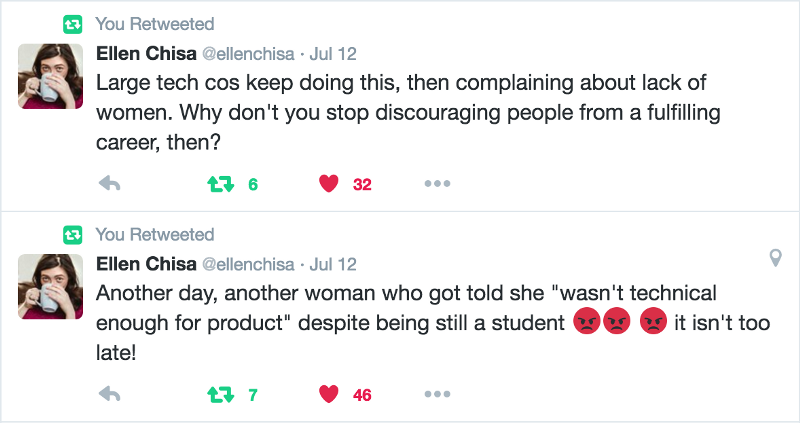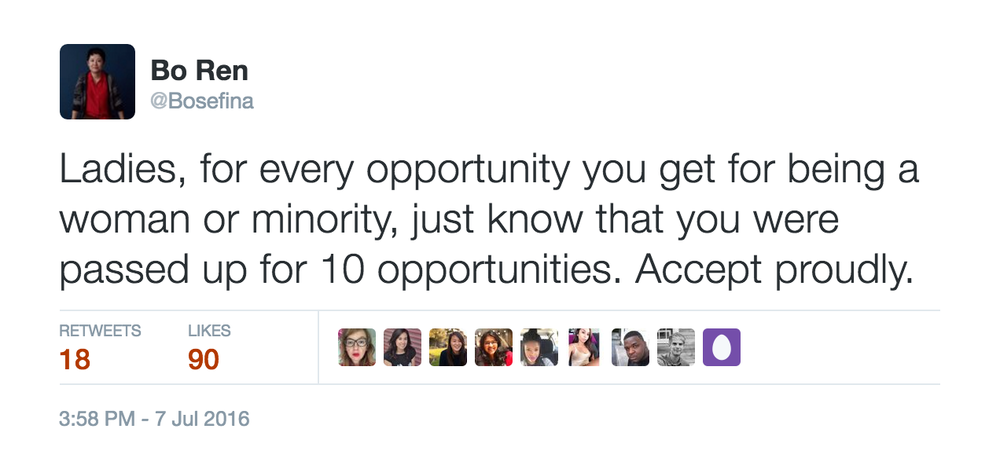“Are we still living in a time where a woman could be seen as too ambitious? ” asks Alison Taffel Rabinowitz
By Bo Ren, Product Manager, Tumblr
Please note: my last day at Facebook was Friday, July 8th, 2016. I am no longer a Facebook employee nor am I writing on behalf of the company. This is my own personal experience and opinion on cracking into product management from a diverse, nontraditional path as a female minority PM. The intention of this story is to raise awareness about how complicit people in power are perpetuating a broken system that is not merit based to minorities and women. I want to raise awareness to invisible forces at play by pointing out disparities and equipping my readers with coping mechanisms and a call to action for reform.
Facebook recently released its diversity numbers. Despite its best efforts — hiring a global diversity chief and marshaling resources — it continues to struggle with hiring women and minorities in technical and leadership roles. Not much has changed in the last two years.
If diversity were a product that launched 2 years ago it would be considered a failure. A product that stagnates for two years has a growth problem.
When I wanted to become a product manager five years ago, I was told by countless people that I wasn’t technical enough (no CS degree), that I needed a MBA, that I didn’t fit into the Stanford cookie cutter mold (I went to USC on full ride scholarship instead). A lot of nay sayers. At my first startup, the director of PM told me he had never met someone like me before (I didn’t fit easily into a box). At my second startup, while aspiring to transition from being a technical project manager to product manager, the incoming VP of Product from Google changed the PM profile: you either had to have a CS degree or MBA to become a PM. Even existing product managers thought this was absurd since they would not have made the cut based on the new criteria. The invisible bar I had to hit to become a PM kept moving.
All the things that I secretly thought — I was lesser, different, and discriminated against coming from a non-technical, untraditional PM path — were true.
Words have power and the narratives we are told penetrate deep into our psyche. If you are told enough times that you’re not technical enough or good enough for a job, you start to believe that. This is stereotype threat in full effect.
A few weeks ago, I was shocked to see how blatantly easy it was for a white male colleague to become a product manager.
I had been training him to backfill my job after giving notice that I am moving to New York to join Tumblr. I had been training him for about a month to backfill my role so the team could operate smoothly in the next half (six month stretch) after I left.
Here are the facts:
- My manager wanted to promote him to a PM despite internal HR requirements that internal transfers be on their current team for at least a year. He was still three months short from meeting that requirement. My manager bent over backwards to promote this guy and override HR.
- In order to become a Facebook PM you need to go through the PM circuit where you are interviewed by three PMs for various aspects: execution, leadership, product sense, etc.
- During our last 1:1, I asked him if I could help him prepare for his PM interview circuit. To my surprise, he replied“[They’ve] got my back, I’m not worried about it.” They referred to the two men in power in our organization.
I was taken aback by his arrogance, bravado, and confidence. Facebook’s PM circuit is not an easy interview process. In tech and other fields dominated by men, we over index on confidence instead of competence.
To pass the PM circuit at Facebook, I had done interview practices with multiple engineering and PM friends, read Jackie Bavaro’s book Acing the PM Interview , crawled Quora and Glassdoor for practice questions, and whiteboarded whole weekends solving Fermi problems and product hypotheticals. You can read more about my interview experience at Facebook here.
I had pored over 100 hours preparing for my PM interviews whereas this dude thought he didn’t need to prepare because two men in leadership had his back.
I had to work 100X harder. Yet, up until that point, I felt lesser like something was wrong with myself. I had been told that “you don’t fit into the profile of a Facebook PM.” I had beaten myself up for not being technical enough, aggressive enough, outspoken enough etc. I am creative and think expansively. I am a zero to one PM who can build something from nothing instead of making micro-optimizations on existing products. Yet my strengths were viewed as weaknesses in my manager’s eyes.
I realized in that moment, shocked by what I just heard, that I had earned my place as a PM.I fucking earned it because no one gave me the benefit of the doubt.
Women and minorities (especially double minorities) who want to pursue product management, design, or engineering are constantly told that they are not technical enough or good enough to become X. But here stands in front of me this white dude with no PM experience — less than a year’s worth of experience on my team — who flagrantly thinks he didn’t need to prepare for the rigorous PM interview circuit.

Why do we doubt ourselves?
Why do we try so hard to prove ourselves?
Why do we mistake our strengths for weaknesses?
Why do we blame ourselves for failures and variables out of our control?
Why did we believe that we are inferior to men with CS majors?
Because we are told that we don’t cut it, even when we have the same or higher qualifications. There is a gulf between a privileged mediocre candidate and an excellent minority candidate. It’s the tension between the B, B+, B- folks versus the A, A-, A+ folks. Yet, even after college, there’s still grade inflation for mediocre white men.
It is flawed to look to women in power as indicators of progress in diversity. Just having Sheryl Sandberg, Marissa Mayer, and Mary Barra (all white women) in power is not enough for furthering diversity. If you are an excellent, smart, Ivy League graduate who is an early employee of a big tech company, you are going to do just fine despite difficulties and biases along the way. But what about the the other candidates who are not as fortunate?
Instead what we should look to is intersectionality in race, gender, age, and culture as markers of progress. How many Asian American, African American, Hispanic women, LGBT members are leading companies?
The gap between what’s preached and practiced at tech companies creates disillusionment.
The world is not fair so let’s not pretend it is in a politically correct environment. In fact, it does women and minorities more disservice to be indoctrinated into believing that they will be treated fairly when they won’t be. When a company’s values are so inconsistent with your own personal experience at that company, the best way to rationalize that disconnect is to blame the situation on yourself. Women do this all the time asking themselves what did I do wrong? Why didn’t I react differently in that situation? We beat ourselves up even when we should be looking at the unfavorable situations where we couldn’t win in the first place.
I will tell my daughter that she will be treated differently and discouraged to pursue technical and management roles. But I will also tell her to ignore the naysayers and not let anyone tell her something isn’t possible. She is going to prove people wrong.
It’s sad reading the amount of discrimination women and minorities face in tech. Reading the stats makes me want to quit tech. Venture capitalists and tech companies saying that it’s a funnel or pipeline problem and not an actual discrimination problem makes me even more sad. It makes me sad because it’s simply not true.
I’m tired of being sad.
What is not sad is rising above all the hardships and acknowledging that you earned it. You beat the odds getting to where you are. No one gave us any breaks or short cuts, we made it here despite the naysayers, institutional bias, and tech company profiles.
I love being a double minority (woman and a minority) because I know I have earned my success. No one gave it to me.
I earned it. You earned it. We earned it. Don’t let anyone tell you otherwise.
For far too long I have been afraid to write about diversity, afraid of the repercussions, afraid that I will burn bridges, afraid that I will be viewed as a disgruntled employee, afraid that I will be deemed as the next Yelp girl. But I can’t not write about this social issue. The needle is moved when people become uncomfortable by the facts and stories. Stories build a pattern. Patterns point to a trend.
As technologists, we solve problems.
We need to be as rigorous about solving the diversity problem in tech as we are in solving product problems at our respective companies.
I am asking all companies to look at diversity as a broken product. What post-mortem analysis can we run to understand our stagnating numbers? How can we debug the reason why diversity numbers haven’t changed? What are some institutional biases we can tease out? What are some user studies we can run? Fix diversity. Fix it now. Diverse teams build better products, better products yield more revenue, more revenue creates happy investors and shareholders. Diversity is a bottomline for every business.
If you are a manager, director, VP, or founder, be conscious of who you promote. Are you promoting someone because they are similar to you or because they are competent? Are you hiring or promoting based on potential vs. proven track record? If based on potential, are you applying that fairly to women AND men? People who look like you and who DON’T look like you?
If you are a recruiter, don’t hire on “culture fit”. This is a BS rationalization of promoting one culture — white frat boy “brogrammer” — over all others. Please stop telling your candidates that you are hiring them because they are diverse candidates. Tell them they earned it. You nip the impostor syndrome in the bud when you tell them they’ve earned it. Tell them that they got the offer besides embodying attributes that fit into your hiring quota. Tell your candidate that he/she is just as capable as someone who comes from privilege.
Do your part. Don’t become complicit in this broken system. Let’s take a new look into diversity and solve its growth problem. Together, we can do this.
Thank you Ellen Chisa, Julie Ann Horvath, Lesley Grossblatt, Stephanie Szeto, Katie Tsang, Ashley Dotterweich, Bruna de Goes, and Henry Soong for giving me the strength to publish this piece ❤
About the guest blogger: BBo Ren is a product manager at Tumblr building mobile content creation tools. Prior to Tumblr, she worked at Facebook and Instagram. She believes stories compound to create change. Follow her on Twitter at @bosefina and she writes on www.bosefina.com.

